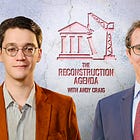Listen to Zooming In at The UnPopulist in your favorite podcast app: Apple Podcasts | Spotify | Google Podcasts | RSS | YouTube
Landry Ayres: Welcome back to Zooming In at The UnPopulist. I’m Landry Ayres.
A post-Trump America may feel distant right now, but the work of imagining what a liberal reconstruction could look like has already begun. After years of executive overreach, collapsing guardrails, and an unprecedented centralization of presidential power, the question facing the country isn’t only how to limit further damage—it’s how to rebuild a constitutional order that’s stronger, fairer, and resistant to the next would-be strongman.
In this episode, host Aaron Ross Powell sits down with The UnPopulist’s Shikha Dalmia and Andy Craig to introduce The Reconstruction Agenda, our ambitious new project dedicated to answering that question. They explore how civic resistance, institutional memory, and America’s own constitutional traditions can fuel a genuine renewal, and which reforms—big and small—might be ready the moment the political window opens.
We hope you enjoy.
A transcript of today’s podcast appears below. It has been edited for flow and clarity.
Aaron Ross Powell: The UnPopulist recently launched a new project called the Reconstruction Agenda, with Andy Craig leading it. Shikha, why don’t you start by telling us what it is?
Shikha Dalmia: The impetus for this project was that we’ve got to start thinking about a post-Trump, post-authoritarian world. Trump is not going to live forever, and we are expecting that a moment will come when Americans will be tired and exhausted from what this presidency has wrought. At that point, I think we are going to have a political moment where we as liberals can start taking back the country and rebuilding it in a way that we want.
Trump has done unprecedented damage to our institutions, our governing norms, and just basic civic virtue. No president has done this much institutional destruction as Trump has. And there are two aspects to this destruction. One: He has done something we haven’t seen in American politics before at the national level, which is unleash a patrimonial style of governance, which Jonathan Rauch has written about beautifully. We actually ran a piece by Alan Elrod, even before Rauch wrote his excellent piece in The Atlantic, pointing out what’s different about the Trump presidency. He wants to concentrate power within himself and the executive branch. And what accompanies a patrimonial style of politics is always and everywhere corruption and cronyism. We have been seeing that in droves since he got elected. So that’s one aspect.
The second aspect is that he is engaging in authoritarian consolidation—concentration of power within the executive branch for all kinds of reasons, partly corruption, but partly also to advance the MAGA agenda in a way that is completely alien and foreign to the way the American government was conceived. He’s been remaking the presidency in his own image and also for the purpose of weakening the opposition, preventing it from ever being able to compete electorally on a level playing field. This is common to authoritarians all over the world. Viktor Orbán has done it. [Narendra] Modi has done it. The Law and Justice Party in Poland has done it. They all have the same rulebook when it comes to authoritarian consolidation. But what is also very striking about Trump is that he has consolidated more power in 10 months than Orbán or Modi did in eight years. He hit the ground running. He came and, thanks to Project 2025, had already queued up exactly what he was going to do through executive orders. He has passed [over 200] executive orders in the first 10 months—around 50 fewer than Obama, who in the right-wing imagination was considered the Caesar president, passed [throughout two full terms]. Biden came nowhere close. So we are seeing a concentration of executive power at a scale that we have never experienced in this country ever.
Last year, we had also launched something called the Fireproofing the Presidency series. The purpose of that series—at that time, we were somewhat hopeful that Trump wouldn’t get reelected—was to start rebuilding the guardrails around the presidency that have eroded for all kinds of reasons that don’t have to do with Trump over the last 250 years, but for a lot of reasons that Trump showed us in his first term in office. The Biden administration, to its eternal shame, woefully neglected the fireproofing of the presidency. And it contributed to the weakening of the guardrails around the office of the executive by all kinds of means—the big student loan forgiveness program, expanding the executive surveillance powers, and so on. Our hope was that we would start identifying very concrete ways, not pie in the sky ones, that may have been politically difficult but still realistic, to guardrail a presidency and to prevent future abuses.
Well, Trump got reelected. He has unified control of the government, and he is using that to the hilt. From the first day in office, he not only decimated whatever few remaining guardrails there were, but actual institutional destruction of the other branches of government. He has completely disregarded the power of the purse. His motto is that if the other branches of government don’t stop his illegality or his unconstitutional behavior, he’s allowed. It’s a very different mentality. No other president has approached the office this way. Presidents take an oath to protect and enforce the Constitution. And Trump’s mentality is that unless somebody comes and actually stops him, he’ll violate the Constitution. So at this stage, as Jack Goldsmith said at LibCon, we are witnessing the dropping of an atomic bomb. He mentioned it in the context of the Department of Justice, but I would expand that to all our institutions.
So we decided, at The UnPopulist, that not only do we need an agenda for fireproofing the presidency, we need an entire agenda to reconstruct our institutions and reconstruct the checks and balances in a way that we are not returning to the status quo ante. Our institutions had, in fact, ossified; they had, in fact, eroded and weakened. [The goal is to make them] stronger and not vulnerable to an authoritarian takeover again and also deliver better governing results so that the appeal of strongman politics is diminished.
Powell: Andy, why call this the “Reconstruction Agenda” as opposed to “The Rebuilding” or “The Reform” or “The What Comes Next Agenda?” Is it an explicit callback to Reconstruction?
Andy Craig: Yes, very much so. I do think it [invokes] a broader sweep of American history. But the aftermath of the Civil War and Reconstruction—which has been called the Second Founding—was genuinely about a radical overhaul of institutions in the aftermath of their complete failure. The Constitution, as originally designed, had broken down with catastrophic consequences. When I look to the Radical Republicans, men like Thaddeus Stevens, who wrote the 14th Amendment, were engaged in American self-governance at its best, which is not just, “We’re going to take all these rules and systems for granted”—but “it’s kind of up to we the living to design better institutions for the future.”
In particular, [the name we went with] was relevant because Reconstruction happened in the aftermath when a large chunk of the country—not the entire country, but a lot of it—had come under a period of constitutional rupture, of illegitimacy. That was always the Union’s position; it was Lincoln’s position in the war that the Confederacy was not a legitimate government, that it was a criminal conspiracy writ large. And that’s relevant to how we think about what’s going on now and the inevitable aftermath of it that is coming. This is not just a government that is pursuing various bad policies. This is a systematic attack in a way that is inherently provoking a legitimacy crisis. What’s going on now is not something that, even if you wanted to, you could build a stable, ongoing system on. Partly because it’s that kind of patrimonial system, as Shikha mentioned, but also just because it’s so incredibly lawless, so incredibly one-sided in that it doesn’t recognize the idea that these are tactics and tools the other side can legitimately use. It’s a very one-way ratchet approach to government. The chaos of all that [is considerable].
“What is very striking about Trump is that he has consolidated more power in 10 months than Orbán or Modi did in eight years. He hit the ground running. He came and, thanks to Project 2025, had already queued up exactly what he was going to do through executive orders. He has passed [over 200] executive orders in the first 10 months—around 50 fewer than Obama, who in the right-wing imagination was considered the Caesar president, passed [throughout two full terms]. Biden came nowhere close. So we are seeing a concentration of executive power at a scale that we have never experienced in this country ever.” — Shikha Dalmia
So, as we approach that, it’s important to be thinking about not just the immediate moment, as important as that is, because there’s a lot of constant crisis going on every day, but how we got here and where we are aiming to go and what a better system would look like informs our strategy now. That’s an essential part of informing what measures we want to take in terms of opposition to the current administration. Because what we’re trying to get to in the aftermath is going to inevitably color those decisions. We’ve seen that come up in the fights in Congress. We’ve seen it come up in the fights in the courts where that’s really a key part of it. It’s not just, “Well, we’re against this”—it’s, “What are we for?” And Reconstruction historically was one such moment, but there have been others.
The American Founding itself, the original drafting of the Constitution, was obviously an exercise in this kind of institutional constitution making. But we’ve also had, for example, the aftermath of Woodrow Wilson when he went on an insane rampage, probably the worst moment for the First Amendment in American history, with the Sedition Acts and throwing dissenters in prison and all that. I mean, [Warren G.] Harding, who’s a poorly rated American president in the popular imagination, is maybe a bit underrated because he campaigned on: “We need normalcy.” But then he came in and he pardoned all of Wilson’s political opponents. The laws were reformed or allowed to lapse. And there was that kind of moment of backlash.
Another important example would be the aftermath of Watergate and Nixon. There was a moment of reform then. A lot of the laws we’re talking about now were passed in the mid to late 1970s because of this moment of backlash against the runaway presidency. So we got things like the War Powers Resolution, the Impoundment Control Act, the Church Committee that investigated abuses.
In all these cases, including Reconstruction, there’s a warning in that when that commitment to big, overarching institutional reform flagged, there were some pretty bad consequences. We saw after that moment in the ’70s that things started to swing back pretty heavily towards an expanding presidential power. Obviously, Reconstruction failed horrifically [in certain ways]; federal troops were pulled out of the South and half the country was ceded to white supremacist one-party rule for the next century. And the laws that Wilson abused, a lot of them stayed on the books in ways that later proved problematic and were abused.
So these things matter both in the long term but also for what we’re doing right now in this moment. And, like Shikha mentioned, the man’s not immortal. We’re seeing the strength of the backlash. We are seeing that the effort at authoritarian consolidation will probably ultimately fail. That could come sooner than even the end of this presidential term. So we’ve got to be able to hit the ground running in a way that certainly the Biden administration didn’t.
A big part of that is the focus on the need for accountability. And just to briefly tie it back to historical reconstruction, that’s what section three of the 14th Amendment was about. I don’t think it’s an accident that [we saw] that eviscerated, that principle that if you use violence and lawlessness and fraud against the constitutional system, that’s breaking the rules in a way that has to get you kicked out of the game. We’ve seen examples of this. The most notorious example is the rise of the Nazis, but there are many others where a political movement is allowed to get away with using violence and also participating in the electoral system at the same time. That’s a path to a very dark place and you can’t allow that. So that’s one of the things we need to revisit. There has to be accountability, if not for Trump personally himself at this point, given that he’s a doddering old man and has ill health at this point. But there are a lot of people who have done a lot of very illegal things. And if we’re going to reestablish the rule of law, that’s one of the [areas] where our institutions had already weakened and failed even before Trump [that we ought to address]—this culture of elite impunity that you can be in a high office and break laws and violate people’s rights and not worry about going to prison for it.
Powell: So, I have to ask: How quixotic is this quest for, “When this is behind us, whenever that happens, here are things that have to happen: There have to be consequences; people have to go to prison; we have to reform certain institutions; we have to reassert certain norms”? You can make this list and build it all out, and there’s value in having that on the shelf for people to take up when they’re ready. But the question is: When are they ready? We’re recording this the day after eight Senate Democrats caved on the government shutdown. The way that those senators have been talking is, “We kind of had to give up. We just weren’t winning this. We had to give up.” And everyone is mad at them. But it’s that elite impunity and culture of no consequences for elites that you talked about. The Biden administration had an opportunity to bring the law down on a whole bunch of lawless people, and they largely did not.
So if Trump is gone in Jan. 2029, what’s the likelihood that there [will] be a kind of, “Well, let’s put that behind us. We are all elites players in a status quo that we don’t want to admit has broken and can’t come back. We don’t want to admit how bad things got” [approach]? It’s kind of messy to be accusing your fellow Americans of horrific acts. Like, maybe we get mad at some ICE agents, but for the most part, we’ll pretend that these people didn’t push for what they did and do the things that they did; that they weren’t as openly fascistic and neo-Nazi as they were. That seems like a pretty plausible scenario that there [will be] a, “We got out of that; it’s behind us” kind of head in the sand [approach] again, and no real urge for reform. Congress seems to have just given up. It’s like institutional pride. The Supreme Court ... it’s difficult to know what’s going on with it, but it seems to have decided that its best role is as a junior player to a unitary executive. What’s the likelihood that people pay attention, I suppose, to the valuable work that the two of you are doing?
Dalmia: I’ve thought about that a lot. I think what’s different about this political moment compared to the previous moments when we had something of a program of institutional rebuilding that Andy mentioned, especially in the 20th century after Woodrow Wilson—and, to Andy’s list of Wilson and Nixon, I’ll also add the FDR presidency, where we passed a constitutional amendment limiting a presidency to two terms, which was just a norm till then—at all of those moments, there was a bipartisan consensus that we need to do something about the overweening executive. That is particularly the case after Nixon, who [left before being] impeached formally [after] his own party said, “You’ve got to go.” We are not at that moment right now.
We are in a moment of political polarization where there is no hope, as far as I’m concerned, for a MAGAfied Republican Party to come in and lead this task of institutional rebuilding. The Republican Party has completely given in to waging the culture wars and winning them by any means necessary. And that requires institutional destruction of the magnitude that we are witnessing right now, which is why the Republican Party is going along with it.
On the Democratic side, one of the dangers that you mentioned is that there will be a need to return to normalcy without accountability. And, to be completely honest with you, this is something that I think we will have to workshop as part of the Reconstruction Agenda. To what extent do we want to hold the culprits of these grossest violations of the rule of law accountable? And how do we do it in a way that it doesn’t seem like retribution and you are in an endless doom-loop of the weaponization of the executive branch to just go after your political opponents? We have to figure out some principled ways of making those distinctions. That’s one of the things that we’ll be doing in the Reconstruction Agenda project.
“In particular, [the name we went with] was relevant because Reconstruction happened in the aftermath when a large chunk of the country—not the entire country, but a lot of it—had come under a period of constitutional rupture, of illegitimacy. That was always the Union’s position; it was Lincoln’s position in the war that the Confederacy was not a legitimate government, that it was a criminal conspiracy writ large. And that’s relevant to how we think about what’s going on now and the inevitable aftermath of it that is coming. This is not just a government that is pursuing various bad policies. This is a systematic attack in a way that is inherently provoking a legitimacy crisis.” — Andy Craig
But the other reason is that a classic prisoner’s dilemma logic kicks in when norms are broken. Norms work when both sides observe them, because they both have something to gain. When one starts violating norms in the way that Trump has been doing, there’s very little incentive for the other side to then obey because they always will come out losers. And so rebuilding these norms is extremely important because the inherent logic of this prisoner’s dilemma is that the Democrats will come into office and they’ll want to profit from the norm- and rule-breaking to use these levers of state power for their own advantage.
I am not hearing anything from the Democrats right now that suggests they actually want to rebuild these norms. If you look at the political discourse coming out of the Democratic Party right now, it is really about, “Let’s try and figure out what the median voter wants”—which is basically affordability. And that’s a good project. But they’re not really talking about taking on authoritarianism and rebuilding institutions. That agenda has to be forcefully and aggressively injected in our political discourse.
Craig: That’s the failure we saw last time. And, because of that failure, here we are again. If we just keep going where this is the coin toss that’s up at every election between a sclerotic Democratic Party on the one hand, and an avowedly anti-constitutional, anti-lowercase d democratic party on the other, then the system will inevitably break down in even bigger and worse ways. And the next autocrat who comes along will do even more damage.
But the other thing about the scope of possibilities, what’s politically viable and practical (something I think about a lot), is that a lot of elite discourse has really underestimated and is missing the strength and increasing radicalization of the backlash against what Trump is doing. This is not like the first term when he was a buffoon, when he did a lot of chaotic things but life more or less went on. We are seeing people being terrified in the streets. We’re seeing children being tear gassed. We are seeing what amount to torture camps being run by the United States government through ICE. We are seeing the complete breakdown of the executive branch following congressional appropriations, the power of the purse. That’s the core fundamental bedrock of Anglo American constitutionalism going back centuries, to the English civil wars and before.
Once you have all these things in place, because Trump’s second term has been so radical, there are going to be opportunities for radical reform. And, like all these other examples, the political desire and appetite for that will fade over time. But that’s why it’s all the more important to hit the ground running and get as much done as quickly as possible when we have the opportunity.
Dalmia: The way I put it is that we need a Project 2029 for liberals and for reconstruction where we have an ambitious and radical agenda of constitutional, institutional rebuilding—a reconstruction of civic norms, frankly. And it has to be detailed. It has to be comprehensive. And, as you said, Aaron, it has to be on the shelf for people to refer to and pick up and start plugging into their daily discourse and lawmaking and litigation strategies.
Powell: My worry is what—and I’d love to pick both of your brains on how concerned you are about this—that pent up energy for a backlash looks like in practice. Because you can imagine something like the Russian Revolution, like the final days of the czars. There are a lot of parallels here; there had been movements for greater liberalism and those didn’t win out. There’s a lot of worry right now that New York just elected a democratic socialist and about nationalizing the means of production and so on. There was the anger at George W. Bush, but that pales in comparison to what we’re seeing now. How worried should we be that this leads to a populist leftist backlash—maybe not as bad as MAGA, but still quite bad from a liberal perspective—instead of a reassert the rule of law, reform the institutions to protect constitutional rights and get us to something that looks like liberalism backlash?
Craig: No, that’s a legitimate fear. We have seen examples of countries—Russia is certainly one—where there was this a right-wing authoritarian period followed by a left-wing authoritarian period. And that’s certainly not what we want to have. I think there are reasons for optimism in the American context. Our current broadly left of center [movement]—we could think of it as the broad liberal coalition—runs all the way from Never-Trump conservatives to, predominantly, the Democratic Party as we know it, both its left flank and its more moderate flanks. The No Kings protests are a great example of how this [movement] is wrapped up in this deep American tradition of liberalism, the classical liberal heritage of America. It was the Constitution; it was people quoting the Declaration of Independence; it was people casting Trump quite rightly as akin to King George III and all the grievances against him. When I look at all of that, while there’s certainly plenty to criticize the left flank of the Democratic Party for when it comes to the people who embrace “democratic socialist” as a label—even though I would argue they are not actually democratic socialist as properly defined, as compared to their historical and European peers—there is a degree of throwing the baby out with the bathwater.
I think this is particularly acute when we look at the thing that might be the biggest flashpoint between our kind of liberals and people farther on the left: markets and capitalism. I think it’s important to make the liberal case that a market economy is an essential component of a free society. At the same time, there is a little bit of meat in the middle here. I mean, if we look at the current billionaires who have swung behind Trump—figures like Musk and Bezos, and I think we’ve seen it with Zuckerberg and others—there’s a liberal critique to make that a lot of these concentrations of wealth are artificial, that these have not been purely market-driven. There’s been a lot of rent-seeking. There’s been a lot of regulatory capture. There’s been a lot of subsidies and various [similar] things. I think part of our pitch to people who are in the eat-the-rich, bring-out-the-guillotines crowd is going to be, “Look, yeah, you can go after and retaliate and punish these guys for what they’ve done. Many of them do need to be held accountable for things they’ve done. But if you really want to get to the root of the problem, you need to address the pre-distribution side, not the redistribution side,” to get a little technical on the economics. If you’re leaving in place this system that even from our free market perspective has produced these ... “robber barons” is not an unapt comparison, you really need to get to the systemic causes of that instead of just coming in afterwards and saying, “Well, we’re going to tax them higher.”
In a way, this is us offering the more radical reforms. It’s about saying that we’re going to come in and break the systems that cause this degree of distortion in the market and that the traditional more left-wing bleeding into socialist, progressive, whatever solutions are actually insufficient to address these problems, and that we’ve got the more important package. But, big picture, I do think we’re seeing in the strength of this backlash an appreciation that the United States does have this deep cultural strain of classical liberalism, of anti-authoritarianism, of constitutionalism, in a way that not all other countries have been lucky enough to have.
So, we have to play that up. We have to lean into that. We have to own it. We’re the heirs of the party of Lincoln, and all these other great liberal reformers [who] have come along over the decades and centuries, and [we should] really lean into that. I’m actually pretty confident that we will see things tending more in that direction. The danger is going to be not one of Hugo Chavez-style leftist populism run amok. The bigger danger is going to be exactly what we were talking about: that the support for reform fades, that there’s not a pushing that goes far or hard enough in that moment of opportunity. That’s actually what I worry about more. But it is important. In my writing and in the Reconstruction Agenda, we [won’t be] afraid to critique the left when they’re going down some rabbit hole that we think is unproductive or that will in some ways produce even greater concentrations of power to allow a future government to blackmail and coerce all these pillars of private society and civil society and the economy. When you’re looking at just giving more arbitrary regulatory and related sorts of powers to the government, that’s power in the executive branch.
There will be a next Republican president at some point, hopefully not elected in 2028, but that’s another related [issue]. Certainly electoral reform and structural reforms to democracy and trying to get to a more multi-party system are [needed]. The pre-Trump status quo failed and brought us to this moment. We need to engage with all that.
But having said that, I don’t expect that, in the aftermath, there won’t be a Republican Party anymore. There will be two dominant center-right and center-left parties in pretty much any system. And we have to get to a place where sometimes conservatives can win elections and it’s not the end of the Republic.
Dalmia: I completely agree. To buttress the point about how, in this way, America is different from other countries that are experiencing democratic backsliding: the fact that our constitutional traditions are much stronger gives the resistance movement an automatic, natural, authentic vocabulary to draw on, to craft its case. But beyond that, the way the resistance movement is conducting itself is also very instructive. First of all, Trump is facing far greater resistance than any other authoritarian in any other country. Modi remained intensely popular in India, despite his absolutely blunderous policy of demonetization. I mean, the year after that, nine out of 10 Hindu Indians were still supporting him. The dominant majority in India is a Hindu majority. Orbán—no real resistance. And in both [India and Hungary], the remaking and restructuring of the institutions towards authoritarianism has been so fundamental and is so far gone that I don’t see it really coming back. In both these countries, the opposition may win—especially Hungary, where it’s looking pretty promising right now—but the idea that a reconstruction [is needed] is simply going to not materialize in these countries.
“A classic prisoner’s dilemma logic kicks in when norms are broken. Norms work when both sides observe them, because they both have something to gain. When one starts violating norms in the way that Trump has been doing, there’s very little incentive for the other side to then obey because they always will come out losers. And so rebuilding these norms is extremely important because the inherent logic of this prisoner’s dilemma is that the Democrats will come into office and they’ll want to profit from the norm- and rule-breaking to use these levers of state power for their own advantage.” — Shikha Dalmia
In America, however, if you look at the resistance, you are beginning to see some signs of this congealing on the Democratic side. Gavin Newsom, who hasn’t really distinguished himself as the governor of California, and had this moment after Trump got elected that he thought he was going to reach out to the MAGA right, in a silly attempt to get some swing MAGA voters, and invited Steve Bannon and Charlie Kirk to his podcast and was yucking it up with them. But then ICE descended on Los Angeles and turned it into the war zone that Trump was claiming it was, and suddenly Newsom found his inner liberal democrat and made an absolutely brilliant speech calling out Trump’s authoritarianism. A similar dynamic is unfolding in Illinois right now, which has become the hub of Trump’s worst excesses in terms of militarization of law enforcement and calling in the National Guard. It’s kind of become ground zero for it. And [Governor JB] Pritzker has been really good at crafting a case [using] a very American vocabulary against Trump’s authoritarianism.
But even beyond that, if you look at the response of civic society, this actually happens in literally no other country. You have groups of just ordinary citizens in states like Illinois, in Chicago, who are getting together and forming a circle of protection around the vulnerable populations. They are providing meals to undocumented immigrants who are holed up in their homes. They have a warning system that they have developed to alert when an ICE raid is coming or ICE agents are floating around. I live in Washington, D.C., and I’m part of this listserv where we are constantly being alerted to the presence of ICE agents. [These are] civic responses where the citizens take personal risks for no other reason but because they hate this authoritarianism—for most of these people, there’s really nothing in it for them except defending a vulnerable population. That tradition is extremely strong in America. You saw in Reagan’s time, when Reagan was denying asylum to people fleeing El Salvador, [and] El Salvador was our partner in the Cold War, sanctuary churches emerged in this country to give refuge to these people who were hiding. What this does is it unfolds a certain logic which never really works out well for the authoritarian, which is that the more principled resistance that you see from ordinary people, the more draconian the state has to get. And when that fight becomes between the resistance and the draconian state, the moral authority is always on the side of the resistance. And I see that dynamic unfolding right now in the United States.
One other point. Like Andy, I do not see a full blown, left-wing populist authoritarian response to Trump right now. There’s simply nobody in the Democratic bench who’s like that. The future Democratic presidential candidates—Pritzker, Newsom, Pete Buttigieg, Jared Polis, Josh Shapiro—seem pretty normie. I think maybe if Elizabeth Warren were to get more popular, I might worry about it. But [on] Mamdani, the fact that the right has had to turn Mamdani into this populist boogeyman, and he’s running on affordability and on an anti-authoritarian agenda, tells you there isn’t a deep bench of populist authoritarians on the left right now. Now, that might change. I think eventually if we don’t contain this populist fire on the right, it is just inevitable that the left will find its own populist figure. And we really do have to be vigilant about that and guard against that, which is why I think we are in a race with time over here. We either get this under control, build a principled, constitutional, institutional resistance movement, or we will see some really horrible versions emerge on the left as well in due course.
Craig: On the immediate context of Mamdani’s win in New York, I think this effort to make him the boogeyman is going to fail in part for reasons that go to the history of the office of mayor of New York. No mayor of New York has gone on to win any other elected office since the 1870s. And Mamdani is not eligible to run for president. So he’s going to run for reelection, and we’re talking about well into the 2030s, maybe he runs for governor. Even if you believe the worst version of what he’s going to do, the municipal government issues in New York City are going to be boring and of little interest to the rest of the country. I just hope he follows through on one Eric Adams policy and gets them to continue adopting garbage bins, catching up with the rest of the country. But, like, maybe they have a little tax increase. You’re talking about 1 or 2%—that’s the powers this office has in the political perch. It is not equivalent to being the leader of the Democratic Party.
Powell: I want to highlight something you said that I think is really important for thinking about our current moment: the way that ordinary people are responding. I think here was this worry and there was an expectation among a lot of more progressive groups, activist groups, people in marginalized communities, that marginalized communities will get abandoned in whatever horrors came down that those of us who are comfortable, middle class, upper middle class, elites would not be personally impacted by this. And that we would let all the other groups—whether that was immigrants or LGBT people or racial minorities—get thrown to the wolves as long as it didn’t impact us. That would have been awful.
But what I have found extraordinarily heartening in the horrors of the last 10 months is how wrong that turned out to be; how many of the people who are still reasonably comfortable in all of this are making themselves uncomfortable to fight back and are taking real risks. You see the kind of stereotype of these white middle-class wine moms who are going all John Brown right now—they don’t have to, but they’re organizing, they’re taking risks. This is extremely important for the political future of the country. But it also speaks to the quality of America and Americans. Many Americans have really demonstrated their moral fiber and the quality of their character since Trump took office. There’ve been a lot of awful people taking off masks and showing their awfulness, but they seem to be in the decided minority. And I think we all should just take a huge amount of heart in that and hold on to that.
Dalmia: I have a cross-cultural perspective on this. I am very familiar with India and I’ve been speaking out against the authoritarian turn of the Hindu nationalist movement in India. And then I witnessed the same script right here in America with the rise of Trump. And I can just tell you that what is different between India and the United States is that, in India, the resistance movement never had the moral high ground. It was all on the Hindu nationalist side. It was all on the side of this grievance politics. It is very different in America. You have grievance politics, but we still have enough muscle memory of our liberal institutions, our commitment to defend the equal dignity of all, that it is spontaneously emerging. I can’t tell you how many times my Indian friends, who grew up in India and don’t have the same muscle memory as my American friends, will advise me to be cautious even in the way I proceed. And I get none of that from my American friends. My Indian friends just want to be cautious because they are self-protective. So this idea of putting yourself out there and defending abstract rights and vulnerable communities, I really think that is very peculiarly American. And, I mean, I don’t like to use the term “American exceptionalism” because America is not immune to the forces of authoritarianism and cruelty and bigotry and all of that. In that sense, we are like every other people in the world. But we are exceptional because we also have this other strain in our politics where we take certain ideas of justice, equality, and freedom extremely seriously and in a very visceral way.
Powell: Looking ahead, then, to Jan. 2029, what reforms seem the most promising? Amending the Constitution is quite a lift even in the best of times when things are aligned for you. We’re likely to have a fair amount of, “Let’s just put this behind us” thinking. Are there reforms that, say, a democratic trifecta can just get done quickly and relatively easily that will have a meaningful impact in strengthening institutions, moving us back in the right direction and preventing this from happening again?
Craig: Yes, there are. And that’s kind of the heart of this project—gaming out what those are and how they’re obtainable. I will say, on the note of constitutional amendments, a lot of people do write that off as impossible. I’m a little bit more bullish on the prospect of some constitutional amendments, because if you look at the history, there tends to be these long dry spells, and then there’s a spurt of big reform amendments. There was the Reconstruction amendments. There was the Progressive Era amendments. So we’ve seen that. And I do think there are some possible changes in that vein.
“What’s politically viable and practical (something I think about a lot), is that a lot of elite discourse has really underestimated and is missing the strength and increasing radicalization of the backlash against what Trump is doing. This is not like the first term when he was a buffoon, when he did a lot of chaotic things but life more or less went on. We are seeing people being terrified in the streets. We’re seeing children being tear gassed. We are seeing what amount to torture camps being run by the United States government through ICE. We are seeing the complete breakdown of the executive branch following congressional appropriations, the power of the purse. That’s the core fundamental bedrock of Anglo American constitutionalism going back centuries, to the English civil wars and before. Once you have all these things in place, because Trump’s second term has been so radical, there are going to be opportunities for radical reform.” — Andy Craig
What could a Democratic trifecta do? A lot of that is going to involve the deep dissatisfaction with the electoral system. I think that directly relates to how and why we’ve had such a disempowered Congress. Congress has lost its legitimacy of a popular mandate because people feel—correctly—that the electoral system is unresponsive and uncompetitive. So there are things that can be done on a statutory basis and also things at the state level that can be adopted—reforms like proportional representation and having an electoral system where more people’s voices are heard, where you have that kind of buy-in of, “I have a seat at the table,” which a lot of people don’t have. Not just Democrats while they’re out of power, but if you’re a Republican in Massachusetts or wherever, you’re pretty locked out, too. So that’s part of it.
Another part of it is: How do we build within the constitutional constraints systems of accountability and independent oversight within the executive branch—things like inspectors general, but also things that involve laws you can pass to create causes of action, so you can get into court and actually sue over these things and have standing. When you’re able to go in and sue the government, that’s only because there’s a statute allowing it. It’s not just the Constitution itself that necessarily gets you that right. So, [we need to] make those things enforceable, in expanded ways.
There also needs to be a revival of ways of thinking about impeachment. I think it’s very likely we’re going to see another impeachment trial after the midterms. Democrats are going to retake the House most likely, and there’s going to be an immense groundswell, even if they have to be dragged along into doing it. And so we need to be ready to think about how impeachment can be retooled in ways that makes it a more viable threat. And some of that, [the fact] that you need two-thirds in the Senate, that’s a hard constitutional [hurdle]. But there are things you can do to re-empower Congress in its investigatory and oversight abilities and the ways the procedures within Congress, the rules, have concentrated power in the speakership. One very concrete example: So, right now, Mike Johnson has been doing this thing where he keeps ... they call it “district work periods,” and there’s pro forma sessions, but effectively what it amounts to is he’s keeping the House out of session and pushing that all on and on every week where he comes down with it. But that’s not a long-standing traditional power of the speaker. The House meets when the House says it wants to meet, constitutionally. And that’s been usually how it works—they will go home for a break and they will have passed a resolution that says we’re coming back on this day. And the speaker didn’t have any power to do anything about it. Well, that changed. It was actually during Covid, under Nancy Pelosi’s speakership, and it was a well-intentioned, practical thing. [It was a], “We have this more chaotic situation. We need somebody who can make a little bit more on-the-fly decisions about when and how Congress is coming back.” And then that kind of got codified as a permanent rule. But we’re seeing how even well-intentioned, mundane administrative powers can be abused in radical, unexpected ways.
That’s not even something you have to pass as a statute. That’s something that the House, in adopting its rules, needs to rescind that power first thing. And it also needs to rein in the speaker in lots of ways. And the same thing on the Senate side with the majority leader and his power.
But I think it’s important to recognize that these are not all new ideas we’re coming up with. A large part of what this is, is taking ideas that have already been out there circulating for a long time that have fair amount of expert consensus behind them and putting them on people’s agenda as, “This is the thing we can do. And, look, there’s all these fleshed out arguments about how it would work and considering the trade-offs and all those sorts of factors.” I don’t think you really see a lot of that actually coming from any other quarter—not even from the progressive left in terms of, “We’re willing to draw upon the lessons of political science, of the legal academy, where lots of scholarly work has gone into this.” I mean, I have a t-shirt that—and this is going to be a deep cut for our poli-sci nerds—is a picture of the White House and says, “Juan Linz was right.” Juan Linz was the political scientist who really outlined the problems and quantitatively proved that presidential systems are prone to democratic backsliding and authoritarian collapse.
I don’t think the United States going to go completely away [with its current system]. I mean, we’re not going to adopt the Westminster system. It’s not going to be like an American parliament here. There are historical reasons for that: the structure of federalism and the rest of it. But I do think we can take from that lessons moving in that direction about what it would mean to have an executive branch that is really more executive, that is about implementing the decisions and carrying out the laws, not being the legislative leader. For so long now that’s been the role of the president. We take for granted that the president proposes bills and tries to get them through Congress. But really Congress is supposed to be the main partisan—in a not necessarily disparaging way—arena. Congress is supposed to be where we’re having these fights about the big policy decisions. [All that] is supposed to be in the representative legislature. And finding ways to retool that balance is really key.
“I think here was this worry and there was an expectation among a lot of more progressive groups, activist groups, people in marginalized communities, that marginalized communities will get abandoned in whatever horrors came down that those of us who are comfortable, middle class, upper middle class, elites would not be personally impacted by this. And that we would let all the other groups—whether that was immigrants or LGBT people or racial minorities—get thrown to the wolves as long as it didn’t impact us. That would have been awful. But what I have found extraordinarily heartening in the horrors of the last 10 months is how wrong that turned out to be; how many of the people who are still reasonably comfortable in all of this are making themselves uncomfortable to fight back and are taking real risks. You see the kind of stereotype of these white middle-class wine moms who are going all John Brown right now—they don’t have to, but they’re organizing, they’re taking risks.” — Aaron Ross Powell
So, I have my regular essays that we publish at The UnPopulist. But with the Reconstruction Agenda we’re really going to, both for written pieces and also my podcast, bring in these experts who have thought deeply about these issues and thought about them for a long time in ways that go back before Trump. And we’ll really be outlining those, getting away from the pundit hot take economy that we’re so used to—these figures who are kind of generalist in their expertise. I think, if you’re going to really dig into [these matters], like the one I mentioned about the House rules and Johnson, [in a way that is deeply substantive and informed], you need somebody who’s a congressional procedure nerd who knows the rules. Even I get lost in how bewildering the rules in Congress are. In fact, I think a lot of members of Congress don’t understand them. Or, if we’re looking at reforming the courts, you need people who have litigation experience to explain what they would want, [drawing on] their experience doing those kinds of cases. [We want] people who were within the Department of Justice, who can speak to what the norms of non-political interference [had been]—the idea that the White House doesn’t come in and tell you who to prosecute and who not to prosecute. [These are the people who] can really dig into the weeds on that stuff.
So that’s the kind of work I hope the Reconstruction Agenda really brings to the table. That’s [what will be] unique about it. If we want these things to be on the political agenda, they have to be in a form that’s accessible and understood and where normal people who don’t closely follow all the ins and outs and aren’t well versed in all these academic topics can understand and latch onto. So, like electoral reform—if you’re dissatisfied with the electoral system, you don’t necessarily have to understand how droop quotas work and what Duverger’s law is and those kinds of things. You just need somebody credible and trusted who can present to you: “This is the way to reform it. This is the way we avoid this happening again.” And that is what really makes it viable to your question about politicians being able to do it and having the political will to push for these ideas.
Dalmia: Just after Trump got elected, The UnPopulist launched something called Executive Watch whose purpose was to track the abuses and the weaponization of the executive branch in real time, the institutional decimation that was happening. And the thought behind that was that Trump came ready to flood the zone and that if we don’t keep track of the destruction he is causing, we will actually not even remember what it is that we are supposed to reconstruct or resurrect. The first part of this project was that we do this tracker in which we document, every week, what’s happened that week in terms of executive abuses. We’ve got it divided into five categories of abuse: personal grift, political corruption, presidential retribution, power consolidation, policy illegality.
Trump is stress testing our system. He’s exposing the vulnerabilities in our system that have always been there, but have emerged because of just the normal course of erosion and degradation. So we want to be ready to plug these vulnerabilities. And we want to do it in a realistic and thoughtful fashion. I had mentioned the Fireproofing series previously. In that series, what we have started doing is workshopping key reforms that both guardrail the presidency and also restore the balance between the presidency and the other branches of government. Congress has given up its legislative powers to the executive a long time ago. And this is something that, actually, conservatives had been talking about and had been upset about till Trump came along and they [began thinking] that, actually, executive power is a great thing. And we identified very concrete, practical reforms for which we can get bipartisan consensus: fixing the Insurrection Act, taking away the vast sweeping emergency powers that the presidency has been granting, having a federal anti-SLAPP law, limiting the surveillance powers of the executive. And we are documenting and developing these ideas in the hope of building a bipartisan consensus when the moment is right.
© The UnPopulist, 2025
Follow us on Bluesky, Threads, YouTube, TikTok, Facebook, Instagram, and X.
We welcome your reactions and replies. Please adhere to our comments policy.




















